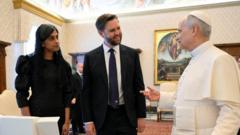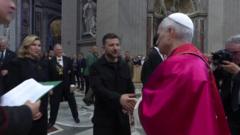Pope Leo XIV, formerly Cardinal Robert Francis Prevost, emerges as a bridge between cultures, reflecting the Church’s evolving global perspective.
Pope Leo XIV Elected: A Historic Moment for the Catholic Church

Pope Leo XIV Elected: A Historic Moment for the Catholic Church
The election of Pope Leo XIV signals a shift in the Vatican as the Church embraces new leadership dynamics.
In a surprising outcome, Cardinal Robert Francis Prevost has been elected as Pope Leo XIV, marking a pivotal moment for the Catholic Church. His election on the second day of the conclave has reverberated throughout the global Roman Catholic community, as he embodies a unique combination of attributes that appeal to both conservative and progressive factions within the Church.
Born and educated in the United States, Pope Leo XIV brings significant financial acumen, crucial for the Church's future sustainability. His previous tenure as a missionary and bishop in Peru and his leadership of the Pontifical Commission for Latin America showcase his deep commitment to regions where the Church thrives, underlining his global perspective.
His predecessor, Pope Francis, had endorsed Prevost's capabilities by appointing him to a high-ranking position, where he was instrumental in selecting bishops—a role that shapes the future trajectory of the Church. As one of the cardinal voters during the conclave, Prevost's reputation as a liberal thinker provided comfort to cardinals concerned about doctrinal traditions. His support for reforms emphasizing a more participatory model of decision-making has resonated well within the Church's leadership circles.
The primary concern regarding Prevost’s candidacy—his American nationality—has seemingly faded as cardinals recognized the need for a departure from historical biases surrounding nationalities in the Church. John Allen, a prominent Vatican analyst, noted that Prevost "checked all the boxes," implying his credentials and vision were unassailable in today’s political context within the Church.
At 69, the new pope is at an ideal age for a leader who must navigate the complexities of modern Church dynamics while steering it toward a progressive future. With his election, the Catholic Church appears ready to embrace a more inclusive and globally aware leadership, a transformation long awaited by many faithful worldwide.
Born and educated in the United States, Pope Leo XIV brings significant financial acumen, crucial for the Church's future sustainability. His previous tenure as a missionary and bishop in Peru and his leadership of the Pontifical Commission for Latin America showcase his deep commitment to regions where the Church thrives, underlining his global perspective.
His predecessor, Pope Francis, had endorsed Prevost's capabilities by appointing him to a high-ranking position, where he was instrumental in selecting bishops—a role that shapes the future trajectory of the Church. As one of the cardinal voters during the conclave, Prevost's reputation as a liberal thinker provided comfort to cardinals concerned about doctrinal traditions. His support for reforms emphasizing a more participatory model of decision-making has resonated well within the Church's leadership circles.
The primary concern regarding Prevost’s candidacy—his American nationality—has seemingly faded as cardinals recognized the need for a departure from historical biases surrounding nationalities in the Church. John Allen, a prominent Vatican analyst, noted that Prevost "checked all the boxes," implying his credentials and vision were unassailable in today’s political context within the Church.
At 69, the new pope is at an ideal age for a leader who must navigate the complexities of modern Church dynamics while steering it toward a progressive future. With his election, the Catholic Church appears ready to embrace a more inclusive and globally aware leadership, a transformation long awaited by many faithful worldwide.




















